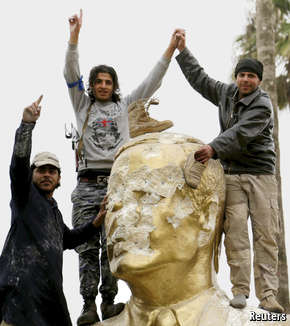Source: The Economist
Despite Iran’s support, Assad is weakening
FOR the rebels fighting against Bashar Assad, it was a huge victory. On March 28th a collection of Islamist fighters, including Jabhat al-Nusra, an al-Qaeda affiliate, captured the city of Idleb. Long contested, it is only the second big one to fall to the rebels in four years of war. The first, Raqqa, was snatched by the jihadists of Islamic State (IS), who made it the capital of their caliphate. Only three days before the rebels won Idleb, they took Bosra, a town in southern Syria famous for its second-century Roman amphitheatre.
This opposition surge suggests that Mr Assad is weaker than he was, not that the rebels are stronger. He and his main allies, Iran and Hizbullah, the Lebanese Shias’ party-cum-militia, are struggling to hold their piece of the divided country, despite the West having turned its attention to fighting IS. Disputes within Mr Assad’s camp are growing, too. “Militarily and economically the regime is worse off today than a year ago,” says Noah Bonsey, who watches Syria for the International Crisis Group, a think-tank based in Brussels.
In Idleb the rain helped the rebels by stopping Mr Assad’s regime carrying out air strikes, which it relies on since it has long been short of soldiers on the ground. The embattled president increasingly banks on local and foreign militias. He has had to recruit more widely for the army, yet he cannot trust the conscripts drawn from Syria’s Sunni-majority population. It is said that Sunni pilots are not now allowed to fly aircraft. A well-connected man in Damascus says many are flown by Russians, whose government backs Mr Assad.
Elsewhere he is looking no stronger. His much-heralded offensive to take back Aleppo earlier this year seems to have fizzled. His troops are consolidating in the west, but only thanks to Hizbullah. IS fighters are creeping into his territory from the east. In the south he has gradually been losing ground to the most moderate of Syria’s rebels, as Hizbullah and Iran focus on securing areas nearer Damascus.
Yet it is unlikely that these victories for the rebels will spur America to increase its modest support for them, especially around Idleb, where Jabhat al-Nusra is the strongest force. The southern rebels have received more help, since they have fewer jihadists in their ranks and are less fragmented. But an American plan to train and equip 5,000 vetted men has still to get going. On March 27th Turkey said that the Americans had delayed their plans to start training there, for unspecified reasons.
So Syria’s fate may depend ever more on how well Mr Assad’s regime hangs together—and on Iran. His army and paramilitary forces often clash. Hizbullah men talk of Syrian soldiers firing on them. Syrian soldiers, in turn, are annoyed by Iranian and Hizbullah checkpoints set up to ensure that they stay in line. Syrian soldiers have long found understandings with rebels; sometimes they agree not to fight, while the rebels sometimes buy ammunition from the soldiers. Overall, Mr Assad’s position is being hollowed out. “The regime is in charge of administrative matters,” says the same Damascus man. “But Iran is ever more in control militarily.”
That could pave the way to negotiations, since it still seems unlikely that either side will win militarily. Iran’s rulers may be more pragmatic than Mr Assad, who wants to cling to power at any cost. There are signs that they see him as a burden; Hizbullah certainly does. If nuclear talks with Iran come good, some Syrians hope for a solution in their own country. “We’ll get rid of Mr Assad at some point,” says a Hizbullah commander. “I think Iran is just waiting until the right time.”



COMMENTS